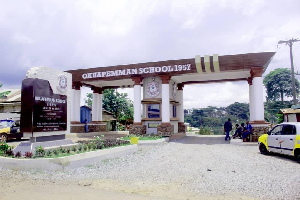- Home - News
- TWI News | TV
- Polls
- Year In Review
- News Archive
- Crime & Punishment
- Politics
- Regional
- Editorial
- Health
- Ghanaians Abroad
- Tabloid
- Africa
- Religion
- Election 2020
- Coronavirus
- News Videos | TV
- Photo Archives
- News Headlines
- Press Release
General News of Friday, 21 July 2006
Source: The Statesman
Editorial: Preventing Future Sodoms And Gomorrahs
THE mushrooming of shanty settlements like Sodom and Gomorrah in our urban centres has been a worry to Government and every right-thinking Ghanaian. Not only do such communities create an eyesore to the individual and the state, it also breeds criminals and anti-social elements because of the population problems attending it and the lack of facilities they engender.
Like the name implies, Sodom and Gomorrah in the heart of the capital is synonymous with illicit sex, crime and drug abuse. It has always bred armed robbers, prostitutes, child labourers and violence. Police raids in the area, problems of poor sanitation and poverty and drudgery are a daily ritual, because of the environment and because of the unstable social setting. That is why any effort by Government to redesign and reconstruct the community ought to be lauded and commended, and that is also why The Statesman would pat Government on the shoulders for going the extra mile in looking for funding to reduce if not remove the scourge of crime and drudgery in the area.
The Statesman believes and, every Ghanaian would agree, that the saga of Sodom and Gomorrah is only a microcosm of the headache of population problems degrading our urban cities and developing settlements. The sad fact simply is that when such settlements begin to fester, the agencies responsible tolerate it, perhaps waiting for the politician to give a directive before heads of those agencies muster some courage to attempt half measures. Eventually exercises that would have ordinarily taken a harmless police action or mild intervention from the appropriate agency now takes a whole process involving billions of cedis of donor support to address.
The canker of mushrooming Sodoms and Gomorrahs did not start today, and neither will it end today. The nagging fact is that there are no indications that that headache and eyesore of shanty would go away today or tomorrow. And, they won’t go away because we have not put in place the practical policies that would ensure that the nation would not breed more Sodoms and Gomorrahs in the future. As far as most Ghanaians are aware, land and housing policy in this nation is only in the minds and documents of the technocrats. One only hears about them on platforms like seminars and workshops. Or campaign grounds when politicians want our votes. On the ground, however, a different story is always told. Chiefs are disposing of huge tracts of land with spineless abandon; and Lands Commission officials, most of the time with huge personal interests in land matters, look on and, sometimes, even condone and connive with allodial owners of land to sell off property belonging to communities to serve the bloated needs of parasitic individuals, without the due compensations going where it should go in terms of community projects.
As capital city, Accra is the heartbeat of the nation; it is the window to our development opportunities and prospects, and it is imperative that we fearlessly implement the infrastructural policies that will not only make the city and its fringe settlements look neat and tidy but also well-planned enough to pass as a modern day city, housing and husbanding state institutions that coordinate development in all respects, including attracting investors and tourists.
Creating Sodoms and Gomorrahs only to make gimmicks out of the situation years later is in no-one’s interest; what we need to do as Ghanaians and as a government is put in place a holistic land and housing policy that would make attempts at creating in future such horrendous settlements virtually impossible. We need not look far to emulate other nations; right here in the sub-region, there are examples we can follow.
The Statesman believes we can change the face of Accra, if we really intend to. We have been oversensitive enough to the warped sensibilities of people inhabiting some of these communities. Ghana must come first. All we therefore need do is implement the relevant policies, without batting an eyelid or looking over our shoulders to check the pulse of our, sometimes, myopic electorate.










